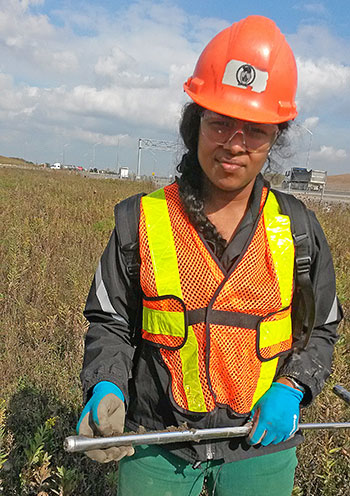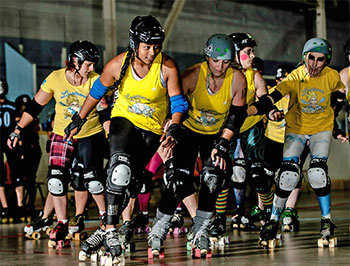Weeding out the Competition
 Whether it’s in the laboratory or on the track, Nimalka Weerasuriya has the same goal: to weed out the competition. Weerasuriya, a Western student in the final year of her Masters in Biology, is both a science and roller derby enthusiast. In the lab, Weerasuriya researches the Buckthorn, with the aim of finding natural ways to eradicate the ever-growing peril to native species caused by the rampant invasion of this plant across North America.
Whether it’s in the laboratory or on the track, Nimalka Weerasuriya has the same goal: to weed out the competition. Weerasuriya, a Western student in the final year of her Masters in Biology, is both a science and roller derby enthusiast. In the lab, Weerasuriya researches the Buckthorn, with the aim of finding natural ways to eradicate the ever-growing peril to native species caused by the rampant invasion of this plant across North America.
“I was drawn to science because of a biotechnology course I took in high school,” comments Weerasuriya, where she did bacterial and fungal plating. Weerasuriya moved to London from Toronto to study biology at Western at the undergraduate level. She followed up with a Masters in Mycology, or the biology and study of fungi, in 2013, under the supervision of Professor Greg Thorn. The Masters in Mycology allowed for hands-on, experiential learning, both inside and outside of the lab. “We spend some of the summer months out in different forested areas across Ontario, collecting soil samples that we bring back to the lab to sequence,” says Weerasuriya, giving her the full 360º learning experience.
The crux of Weerasuriya’s research focuses on Buckthorn, an invasive plant which came to North American in the 1800’s. Buckthorn thrives in recently disturbed habitats and spreads very easily due to animals dispersing seeds, conquering roadsides, riverbanks, forests and farm fields. “Our main objective is to see how Buckthorn interacts with its environmental fungal components both in the soil and in naturally decaying fungi,” comments Weerasuriya. Part of accomplishing this goal involves examining the Buckthorn and the fungus that grows on it, to see if there is a type of fungus that can kill or weaken the species. This will help remove the invasive plant in an efficient fashion so it cannot continue to disrupt the healthy growth patterns of native plants. Another option is to see how Buckthorn changes the soil’s fungal community, which involves the field collection of soil. “Some plants, like garlic mustard, have been found to release defensive chemicals into the soil, so we want to see if Buckthorn does the same,” says Weerasuriya, “If it does, it will interfere with native seedling growth, making rehabilitation more difficult.” Weerasuriya says a possible solution would be use plants that can tolerate the chemicals, or inoculate the soil with organisms that naturally break down the chemicals.
When Weerasuriya is in the laboratory, her day consists of prepping soil samples to get sequenced. “Sequencing allows me to identify the type of fungi that was in the sample and to use one of the identified fungi to “weed out” the invasive Buckthorn plant” says Weerasuriya. To date, the graduate student has identified a large handful of fungi growing on Buckthorn, fungi that could potentially stop the invasive species dead in its tracks.
Checking out the Competition
Outside of the laboratory, Weerasuriya reenergizes on the track – the roller derby track. “Roller derby is a mixture of hockey and old school roller disco,” comments Weerasuriya, which has the added bonus of body checking on quad skates, and funky outfits. Weerasuriya is on a team called ‘The Luscious Lunch Ladies,’ which is one of three Forest City Derby Girls teams in London, Ontario. “The physical aspect allows me to de-stress and have fun, and I enjoy being on a team with such strong-willed and supportive women. It’s very rewarding,” says Weerasuriya. Another benefit is the travel. “I’ve been all over Ontario and even to the States to compete,” comments Weerasuriya. Roller derby offers Weerasuriya both physical and social benefits that she plans to continue incorporating into her daily routine.
 Looking forward, Weerasuriya hopes to get involved with conservation or research work on invasive species after her Masters is completed. “I’d love to work at the Nature Conservancy of Canada (NCC) or in a microbiology laboratory,” says Weerasuriya. Once she gains more experience in the field, Weerasuriya aspires to work for Sporometrics, a Toronto company specializing in environmental and medical microbiology. “This company has the research, laboratory and field component that I crave,” says Weerasuriya.
Looking forward, Weerasuriya hopes to get involved with conservation or research work on invasive species after her Masters is completed. “I’d love to work at the Nature Conservancy of Canada (NCC) or in a microbiology laboratory,” says Weerasuriya. Once she gains more experience in the field, Weerasuriya aspires to work for Sporometrics, a Toronto company specializing in environmental and medical microbiology. “This company has the research, laboratory and field component that I crave,” says Weerasuriya.
With her can-do attitude and competitive nature, Nimalka Weerasuriya is always just a blink away from the next big challenge.

